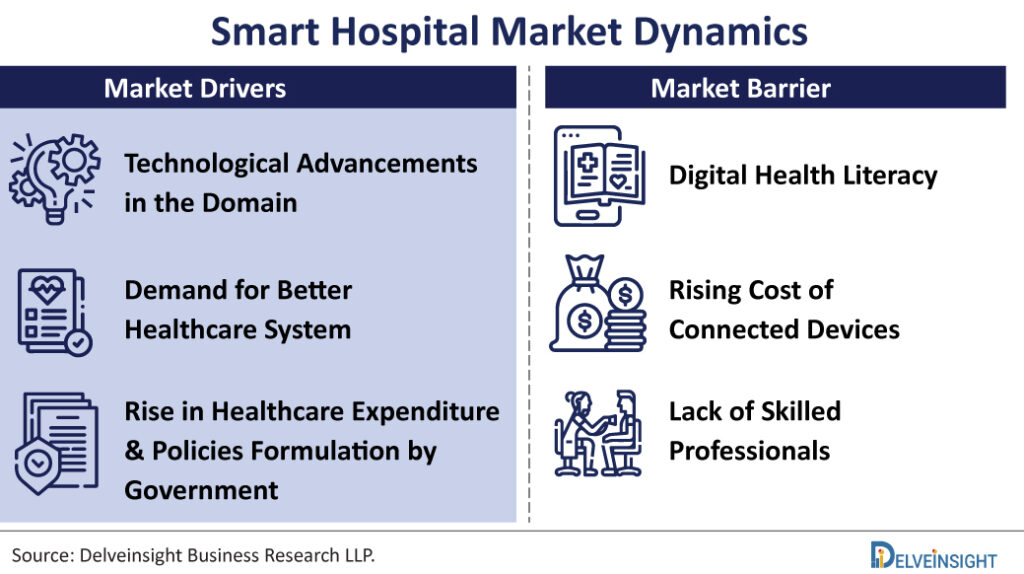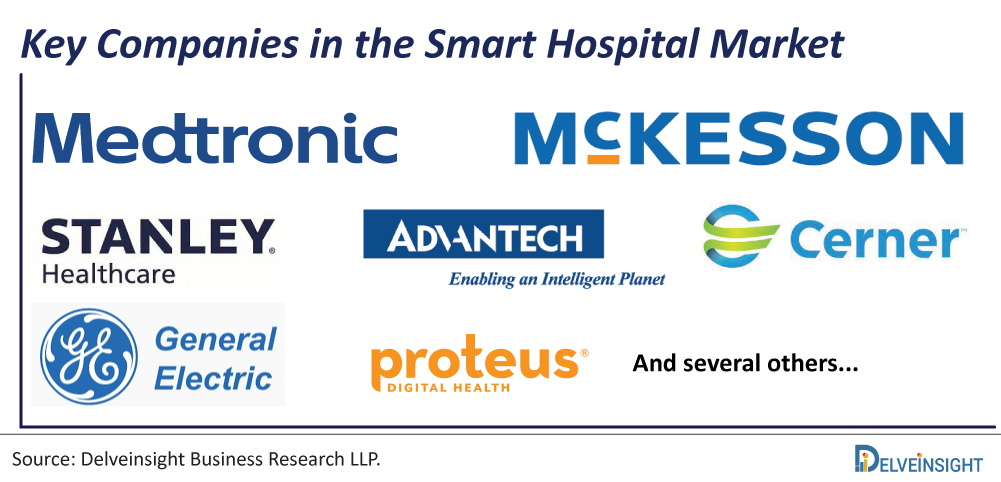Smart Hospital: How it is Shaping the Future of Healthcare Delivery
Nov 03, 2021
Table of Contents
The technological innovations over the past two to three decades have significantly changed the dynamics of various industries. Healthcare is no exception to it. From online appointments to robotic surgery and from telemedicine to digital payments, almost all the segments of healthcare delivery have immensely revolutionised. With each passing day, new groundbreaking medical solutions and applications are being incorporated into the various healthcare segments, making our lives easier, leading to better and quicker healthcare outcomes, patient education, increased life expectancy, and several other benefits. Trust and dependence on technology is growing day by day with quality and positive results.
Apart from the improvement at the technological front, the sedentary lifestyle, high purchasing power, the rising demand for better healthcare, the growing prevalence of chronic disease, and a greater emphasis by the governments, have also created the space for the digital healthcare ecosystem.
Downloads
Click Here To Get the Article in PDF
Recent Articles
- Treating Patients with Software: Digital Therapeutics
- Unveiling the Potential Applications and Challenges of Digital Twins in the Healthcare Industry
- 22 Healthcare Trends & Innovations to Watch in 2022 and Beyond
- Analyzing How Medical Coding is Playing a Conducive Role in Healthcare Service Delivery
- Relievant Medsystems Launched Ablation System; Thermo Fisher’s Reproductive Health Assays; EarliT...
The ongoing Covid-19 pandemic is another critical factor that has led to the rapid adoption of digital health technology. The companies in the tech segment have harnessed the power of digital technologies and health innovation to fulfil various needs despite several challenges due to the pandemic. The people have also availed various digital healthcare services. The spurred demand for digital healthcare is likely to remain high in the coming years as well. The growing incorporation of digital solutions is giving rise to the concept of smart hospitals.
Smart hospitals are designed and built to efficiently address various aspects such as cost, productivity, human resources utilisation, inventory management, among several others. It aims to make clinical processes, infrastructure and management systems interconnected with digitised networking systems. Apart from the quality and operational efficiency, the smart hospital truly cares about nature and the environment. These hospitals also are designed to reduce pollution by ensuring eco-friendly furnishing. The smart hospital ecosystem is anticipated to grow in the coming years due to its immense benefits and increasing demand for better healthcare.
Smart Hospital and its Key Components
The smart hospital is a term for the hospital or healthcare centre which uses the digitised networking infrastructure, including the advanced devices and software, to carry out their operations and functioning. It must be mentioned that it is not just concerned with digitisation but with the smart system that makes the overall process smooth and efficient. For example, the monitoring air quality within hospital premises, implementing high standards of hygiene, inventory records management, implementation of invoicing and transactions system, among other such practices.
Operational efficiency, improving clinical outcomes, and patient-centricity are the critical factors for the smart hospital. In terms of operational efficiency, the smart hospital understands the needs of its medical staff and optimises the workflows by reducing the workload & manpower significantly. It also utilises the hospital’s resources more effectively and makes collaboration across different departments smooth and well organised.
Smart hospitals rely on a single IT environment to carry out the various processes using cloud computing, machine learning methods, and artificial intelligence to deliver healthcare services and to carry out their administration tasks. Based on application, the smart hospital is categorised as electronic health records, mHealth, remote medicine management (or telemedicine), outpatient management, and medical diagnostics. Medical devices are one of the most competitive segments, and it is divided into external wearable devices, implanted medical devices, stationary and supportive medical devices.
Smart hospitals provide immense benefits to both parties involved in the system. To the hospitals, it helps to improve the patient’s relationship, caters to their different needs, maintains costs, and streamlines the communication process. Similarly, it makes the treatment journey smooth for the patients. The healthcare experience, right from scheduling appointments to submitting invoices, becomes unified and takes less time. The advancement in IoT, machine learning, robotics, telemedicine, artificial intelligence, precision medicine, augmented reality, digital imaging, cloud-based computing services, data storage, and genomics will also stimulate the smart hospital market growth in the years to come.
At the macro or national level, the governments worldwide are focused on integrating the hospitals into a nationwide EHR by forming a centralised state register. However, only a few developed countries with small population sizes have initiated this concept right now.
Major Drivers and Barriers in the Smart Hospital Market
Over the past few decades, the rapid growth in chronic diseases such as diabetes and cardiovascular conditions, especially in developed countries, have significantly spurred the demand for healthcare solutions. Hospitals are under pressure to utilise the manpower, handle the rising demand, provide the best services, and also maintenance costs at the same time, which provides ample opportunities for the tech companies to enter the domain.
Some of the major factors such as advancement in technology, rise in healthcare spending, a sedentary lifestyle, growing awareness, and a high rate of adoption of new technologies are expected to drive the smart hospital market growth. Better clinical outcomes and very high-quality care will also encourage people to move and adopt smart hospital services.

Despite several positive outcomes, there are few restraints affecting the market to gain full potential growth, which includes a high cost of connected devices and a lack of awareness about the new technology such as the internet of things.
The data is the backbone of smart hospitals. As it relies heavily on data collection for better results, there is always a risk for the theft or leakage of data from third parties or by someone within the organisation. Over the past few years, there have been several instances where healthcare data breaches have been disclosed by the companies in the digital healthcare system. The risk is also likely to be increased with the growing demand and multiple data exchange points. Apart from this, reimbursement is also another major issue. The privacy policies with product use and the cost will also have an impact on consumer choice and preference. The resistance from both users and healthcare professionals will create some challenges initially. Providing ample training to the healthcare professionals, positive feedback from users, broader scope & application will change the overall dynamics in the coming years.
Key Companies in the Smart Hospital Market
The Smart Hospital Market is evolving significantly, and several new players are entering the segment as the revenue generation prospects are high due to rising demand.

Globally, some of the major MedTech companies in the devices segment for the Smart Hospital include Medtronic, Cerner Corporation, McKesson, St. Jude Medical, SAMSUNG, Renesas Electronics, Philips, GE Healthcare, Siemens, Qualcomm Life, Allengers, Athenahealth, and several others. Similarly, the leading global companies providing solutions in the Smart Hospital market include Microsoft, Athenahealth, SAP, PhysIQ, Diabetizer, AdhereTech, Epic, STANLEY Healthcare, Cerner Corporation, McKesson, CitiusTech, Oracle, Allscripts CitiusTech, and Infor.
Current States of the Smart Hospital
The existing hospital equipped with modern healthcare equipment is termed an advanced hospital. To achieve the status of truly smart hospitals, companies across the globe are diligently working in this direction.
Over the past few years, several smart hospitals in countries such as Canada, the United States, Finland, South Korea, and Australia have become operationalized. The high purchasing power of the citizens residing in these developed countries coupled with growing chronic disease has encouraged companies to enter the smart hospital market. Similarly, oil-rich gulf countries such as UAE, Qatar, and Kuwait, among a few others, are also formulating policies and practices in their healthcare system. In the coming years, the region is expected to emerge as one of the hubs for the smart hospital.
Smart Hospitals Market: Future Scenario
Smart hospitals hold the potential to transform the healthcare system and the healthcare outcome. Worldwide, Governments’ are also keenly focussing on introducing policies & procedures to implement IT solutions and services in their healthcare system. Increased government spending, favourable policies, growing awareness about IoT, and the adoption of connected devices and instruments, will positively stimulate smart hospital growth. Similarly, the increase in collaboration, mergers and acquisitions between the tech companies and the healthcare provider will also make conditions favourable for the smart hospital to prosper and reach new geographies.
Downloads
Article in PDF
Recent Articles
- Mainstay Medical’s ReActiv8-C Study; Swing Therapeutics Announced Results from Studies of S...
- Johnson & Johnson Acquires V-Wave; CalmiGo Launches Anxiety-Management Platform CalmiGo Plus;...
- Emerging Role of Digital Health in the Field of Oncology
- Ethicon’s ETHIZIA Hemostatic Sealing Patch; FDA Approves Medtronic’s Minimally Invasive Device to...
- Boston Scientific Corporation Agreement to Acquire Silk Road Medical; Philips Introduced Duo Veno...



